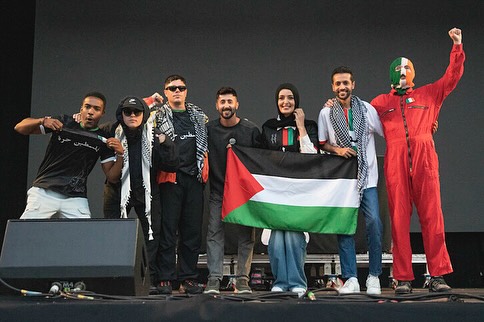BREAKING – Sziget Festival scandal: Hungarian government bans a performer from entering Hungary

Sziget Festival organisers refused to cancel the performance of Irish rap group Kneecap despite a ministerial warning two weeks ago from EU minister János Bóka and several protests. The government has now taken matters into its own hands.
The scandal keeps spinning – HERE is our update.
Hungarian government bans Kneecap from Sziget Festival and entry into Hungary
According to a report by the pro-government Magyar Nemzet, Hungary’s government has banned the Irish rap trio Kneecap from entering the country, citing the group’s “extreme anti-Israel and pro-terrorism statements.” The article lays out a list of allegations, including support for groups designated as terrorist organisations such as Hamas and Hezbollah, chants like “Free Palestine by any means necessary” and “Death to Zionists,” and signs held by the band with slogans such as “Fuck Israel – Free Palestine.” One member had also reportedly wished death upon British conservatives.

The group has denied the accusations, claiming the videos used against them were taken out of context in a smear campaign. They acknowledged their solidarity with Palestinian civilians and suggested that authorities should focus more on the hunger faced by children in Gaza than on flags waved at concerts. These explanations did little to sway officials. As previously reported, one member, Mo Chára (Ó hAnnaidh), was charged in June with supporting terrorism.
British Prime Minister Keir Starmer also waded into the controversy, criticising Kneecap’s appearance at the Glastonbury Festival in June. The BBC notably did not broadcast their performance.
Pushback in Hungary
In mid-July, protesters gathered at the bridge leading to Sziget Island, vowing further demonstrations. Economist and journalist Tamás Vajda wrote an open letter to the festival’s organisers, arguing that the band’s actions should not be considered art or protected by artistic freedom, as they promote hatred. He called Kneecap “an arm of Israel- and life-hating, theocratic, totalitarian movements.” The letter was signed by more than 150 artists.

Two weeks ago, Minister Bóka and festival director Tamás Kádár had agreed to reach out to Hungary’s Jewish community. Either those discussions fell through or proved ineffective, as the government ultimately acted and barred the band members from entry. On July 18 July, Kádár issued a statement acknowledging the dilemma: canceling the performance might be seen as censorship, while allowing it could offend many. “We remain committed to the spirit of free expression, which has been a core value of Sziget for over 30 years,” he said.
- New multicultural hotspot debuts at iconic Sziget Festival!
Authorities are not required to explain bans on foreign citizens, though such decisions are typically justified with vague terms like “national security risk.” How the government intends to prevent the group’s appearance if they attempt to enter Schengen by car remains unclear. In such a case, festival organisers would likely bear the responsibility of reporting it.

Only the band’s singer was banned by the government
According to the latest information, only Mo Chara was banned for three years by the Hungarian government because his entry and presence seriously threaten national security. However, the decision can be challenged in an administrative lawsuit, and if he requests immediate legal protection, he can also ask for the suspension of the enforcement of the decision.”
Past controversies: LGBTQ+ representation
For years, Sziget has been one of Hungary’s premier music festivals, attracting thousands of foreigners—drawn by top-tier acts and relatively low costs compared to Western Europe. Two years ago, Bence Rétvári, an interior ministry official, criticised the festival over a now-deleted promo video that featured same-sex couples, accusing it of promoting so-called “gay propaganda.”
- Innovation: Sziget Festival introduces cheaper, night-only pass for 2025!
While that episode had no major consequences, Szilárd Demeter, head of the Petőfi Cultural Agency—which owns a significant portion of Sziget Island—floated the idea of withdrawing support, including use of the venue.
Read more on the topic of Sziget Festival here.
To read or share this article in Hungarian, click here: Helló Magyar







